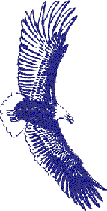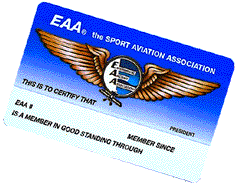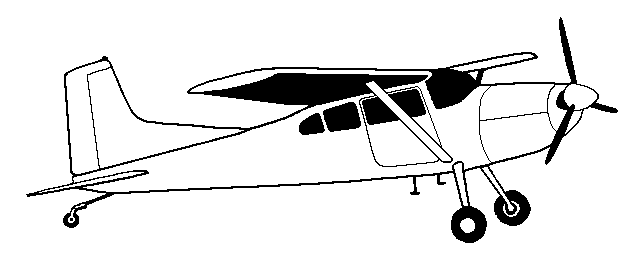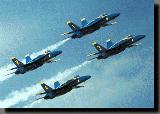|
|
|


 Upcoming Chapter Meetings
Upcoming Chapter Meetings




 Mailbag
Mailbag


Welcome to your newsletter! This editorial, if included at all, will usually be very short. But for this first issue, we have a lot to cover.
On Monday, August 5th, I represented our new chapter at the EAA Chapter Newsletter Editors Meeting at the EAA Convention in Oshkosh. I would estimate that 40 to 50 people attended the meeting. The largest challenge facing most editors is their ongoing move from cutting and pasting a newsletter to preparing it on a PC, and many are planning to post their newsletters on the Internet. All of our chapter's newsletters will be available, in full color, through our chapter home page (http://www.execpc.com/~sroensch/eaa). The meeting had a lot of talk of postage and publishing costs. Different chapters have very different ideas on this - one chapter of 102 members spends $2,000 a year on their newsletter, roughly $20 per member!
My goal is to deliver a newsletter full of information that is meaningful to our members, without breaking the bank. Craig Devenport has offered to produce the newsletter copies on West Bend Air's photocopier, which saves us a substantial amount in copying fees. Thanks, Craig! We will initially have newsletter issues every other month. If you, the members, provide articles and other contributions at a rate that will support it, we can move to a monthly newsletter. We will limit each issue to 8 pages total, to keep each mail piece under 1 ounce. Then, for a bi-monthly newsletter, the postage required is roughly 20% of each member's annual dues (40% for a monthly newsletter). Based on these costs, the board has recommended that we mail each newsletter to every member.
Many chapters have named their newsletter. Examples include Propwash, Hangar Echoes, 44 Flyer, Horizon, Contact, The Intrepid Airmen, Loud and Clear, and Wind in the Wires. Should we name our newsletter? If you think so, please submit your suggestions to me. I will publish them in a future issue, and we can vote.
To fill the newsletter with meaningful information, we must have the participation of the members. Every speaker at the Editors Meeting encouraged us to write an editorial emphasizing that it is the responsibility of all members to contribute, that each of you is obligated to give something back of what you receive through all the camaraderie, fellowship, and free technical advice. This can be a short article or simply a few lines for our "On the Fly" section. If three members contribute to each bi-monthly newsletter, our 60+ members can go over 3 years without repeating contributors! To keep things rolling, I would like the chapter to consider appointing two reporters and a publishing team to assemble and mail the newsletters.
The sections in this first newsletter were based on information given at the Editors Meeting, and on input from our members. Additional sections we are planning:


WOW! That's how I would describe the opportunities available to us as EAA chapter members. It's easy to see how one could have that impression after having attended the Oshkosh fly in. But I had a chance to see it through a different sort of eyes and ears this time.
For example, I had the opportunity to listen to President Tom Poberezny at a chapter leader's conference. He spoke of the challenges and opportunities facing EAA chapters. EAA chapter members are not just introverted homebuilders with spare time on their hands. They are becoming the communities' voice and advocate for aviation in general, and affordable aircraft ownership in particular. They are a group of people who are passionate about what they do. They have a special penchant for aviation and in general are willing to share and give back to their communities the enjoyment of building and flying.
I hope all of you will find a way to contribute to our local chapter. Sometimes all it takes is someone to ask, or a word of encouragement, or an idea that you'd like to share. Please consider how you can make this not just a good organization, but a great one!

First, a little background - I have composite construction experience that includes work on a Long-EZ and a Defiant. I sold pieces of my Long-EZ project in 1984 to begin work on the Defiant. After 12 years of work on the Defiant, I am running out of places to put fiberglass. All flying surfaces are built, the entire fuselage is on the gear and the fuel strakes are nearing completion. Work on engine(s) installation is scheduled to start this Fall.
Recently, changes in the availability of epoxies have created some problems and new experiences for builders using Rutan approved epoxies. These changes have cost me tens of hours of lost time on my project. I hope the information presented here will save you time on your project. "Safe-T-Poxy", the Rutan recommended epoxy from about 1980 to 1994, had two unique characteristics. It had a mix ratio of 44:100 which made it practical and reliable to use a mechanical ratio pump to dispense the resin and hardener AND it was not susceptible to moisture. Since Safe-T-Poxy contains MDA, a cancer causing agent, the manufacturer has stopped selling this product.
Most of the epoxies available today have a mix ratio of about 27:100. Exact measurement of dispensed resin and hardener is more important than for a ratio of 44:100. Therefore, I have abandoned the ratio pump and use an electronic scale, accurate to 0.1 grams, to dispense resin and hardener. Since 0.1 grams is about 3 drops of resin or hardener, an error of a few drops of hardener may be an unacceptable error when mixing small quantities (<50 grams) of epoxy.
Most epoxies, except Safe-T-Poxy, are sensitive to moisture. Humidity in the air causes an "amine blush" on the cured surface of the epoxy. This surface makes the cured epoxy feel like wax paper and must be removed before anything will adhere to the surface. I have found that if the shop temperature is 80F and the relative humidity is less than 40%, the amine blush is minimal for the Aeropoxy material I currently use. I use a dehumidifier to keep the shop humidity below 40%. Open flame heaters should not be used to heat a shop. In addition to heat, they add moisture to the air.
For a more detailed discussion of epoxies, check the most recent issue of the Central States Newsletter. If you don't have access to this publication, let me know. I will get you a copy.
Note: Engine Installation Assistance - I would like to find someone with aircraft engine installation experience that would be available to advise me and/or check my work as I install the engines on my Defiant. I have plans for the installation but Rutan strongly recommends finding experienced help for this part of the project.

Did you know?!!!
That local policy at West Bend airport recommends that all pilots climb on take off to 1600' msl (700' agl) on runway heading.
Reason #1: This allows low performance aircraft (C-152 with two people, etc.) in closed traffic to re-enter the traffic pattern at a better position and altitude for visibility and traffic avoidance. It also clears the way for others making a 45 degree or over the numbers cross wind entry to the orderly flow of traffic.
Reason #2: When the aircraft climbs to this height on runway heading it is much less noise disruptive. Other than in a very small, tight corridor, space and altitude decrease the objectionable noise decibels considerably. Please help us to live in harmony with our community.


We will also be posting all of the Young Eagle Flight Leaders in our chapter on our Internet home page. We will include the names of the Young Eagles each pilot has flown. Please get all your information to me, or to Steve Roensch.

August 13, 1996 Meeting
Present: Howard Kaney
Richard Feldschneider
Allan Price
Glen Brandt
Allen Bruggink
Ron Champeny
Steve Roensch
Absent: Donald Brinkley (excused)
Brief reports were given by:
Howard Kaney, president
Richard Feldschneider, vice president
Allan Price, secretary, membership chairman
Glen Brandt, treasurer
We have $640 collected as membership dues and initial fees.
Not all chapter members, however, are currently EAA members.
Al Price will contact them to ask their intentions. If they
do not wish to join the EAA, we must refund their chapter
dues and fees.President Howard Kaney has organized a program committee comprising himself, Bill Groeneveld, Ron Champeny, and Terry Ganzel. They are working diligently to schedule interesting, meaningful programs at our chapter meetings. It is their intent to have such programs scheduled for a year at a time.
Allen Bruggink assured us that name tags would be appreciated by all members at the chapter meetings so we will investigate this possibility. The board generally agreed that members assigned as greeters would help considerably to get the meeting place prepared and assure a good start for each meeting. It was also agreed that a raffle or drawing now and then might be desirable.
At the chapter meetings, we will furnish soda and coffee to be funded by a freewill offering.
It was agreed that we will disseminate minutes of the Board of Directors meetings via a newsletter but a treasurer's report should be read at the chapter meetings.
Through information provided on the chapter member application form, we are able to prepare a list of members who own aircraft and who are building aircraft. If it seems appropriate, we might include certain special interests yet to be determined. The members will be asked for their input on this subject at the next chapter meeting.
At the next chapter meeting, Al Price will report on the upcoming Open House at the West Bend Municipal Airport on September 8 and the fund-raising potential for our chapter. Don Brinkley will ask for volunteer pilots and planes to run the EAA Young Eagles program at that event. And, Newsletter Editor Steve Roensch will discuss hangar tours at the Open House and he'll report on exciting possibilities for our newsletters in the future.
At the September 18 chapter meeting (third Wednesday of the month), Allen Bruggink, heading up our recognition committee, will introduce a contest to design a chapter patch.
The next board meeting will be Wed, Sept 4, at 7 pm to discuss our plans for the airport Open House. In the future, though, board meetings will probably be an hour before each chapter meeting.


Welcome aboard!




Chapter Meeting: 3rd Wednesday of each month, 7:00 pm
(Bring a chair) West Bend Airport, Hwy 33 East, West Bend, Wisconsin
Board Meeting: 1st Wednesday of each month, 7:00 pm
West Bend Airport, Hwy 33 East, West Bend, Wisconsin
Chapter Events
Sun, Sep 8, 1996 - West Bend Municipal Airport Open House
(Rain date 9/15) West Bend Airport, Hwy 33 East, West Bend, Wisconsin
- Free Admission, sponsored by:
Friends of the West Bend Airport,
Kettle Moraine EAA Chapter #1158
and West Bend Air
- For more information, contact Allan Price,
President, Friends of the West Bend Airport,
Secretary, Kettle Moraine EAA Chapter, 414-334-1278

President Howard Kaney, 414-334-9451, hkaney@execpc.com Vice President Richard Feldschneider II, 414-677-3416 Secretary Allan Price, 414-334-1278 Treasurer Glen Brandt, 414-268-1648 Board Members Allen Bruggink, 414-335-6459 Ron Champeny, 414-334-4309 Newsletter Editor Steve Roensch, 414-375-2228, sroensch@execpc.com Contributing Editor Glen Brandt, 414-268-1648 Young Eagles Coordinator Don Brinkley, 414-335-6519 Membership Chairman Allan Price, 414-334-1278 Internet Webmaster Steve Roensch, 414-375-2228, sroensch@execpc.com Home Page http://www.execpc.com/~sroensch/eaa Historian Ernestine Lynfoot, 414-377-9163


Michael's words to our EAA Chapter members: "Tell them to come on down!"

This and all Kettle Moraine EAA Chapter #1158 newsletters are provided for your enjoyment only. No claim is made and no liability is assumed, expressed or implied as to the accuracy or safety implications of any material presented. Viewpoints of the writers are not necessarily those of this or any EAA Chapter or of the Experimental Aircraft Association (EAA). Use of any of the material presented, whether by applying, copying or quoting, is done solely at the risk of the user.
  Chapter Newsletter Index Chapter Newsletter Index
|
  |


 Kettle Moraine EAA Chapter #1158 Webmaster
Kettle Moraine EAA Chapter #1158 Webmaster